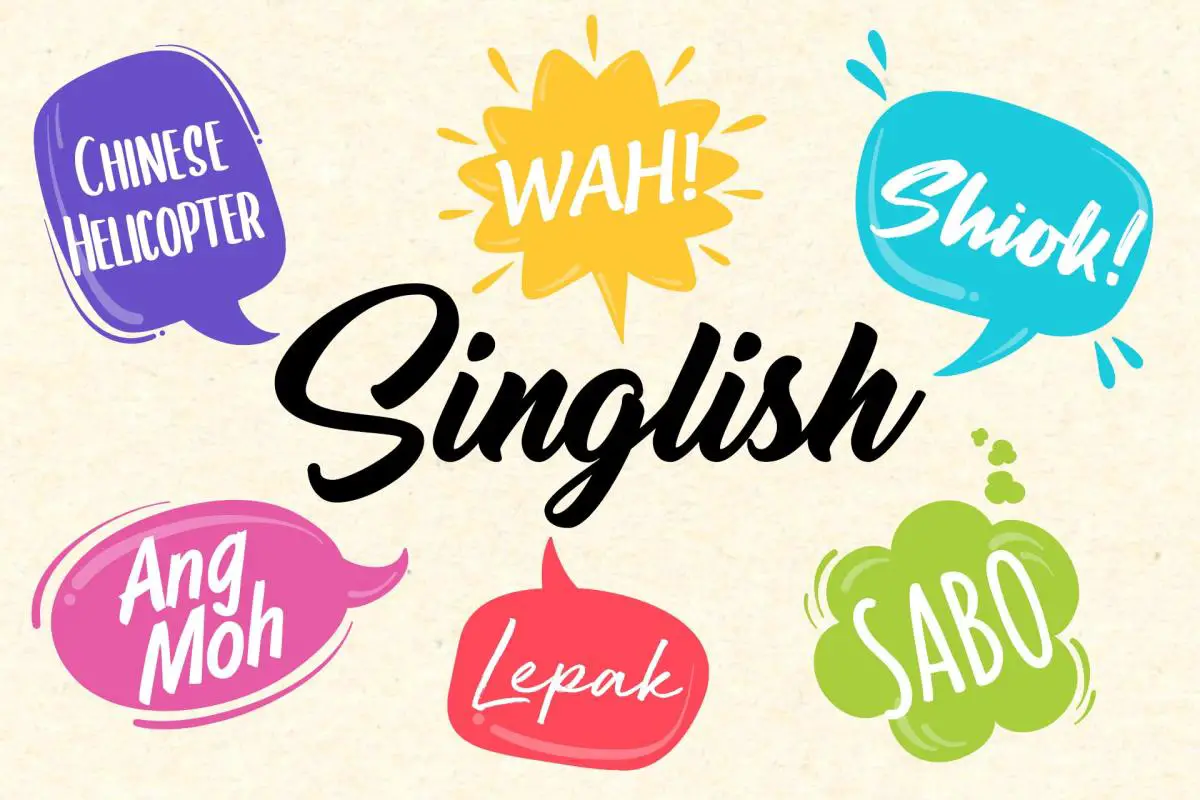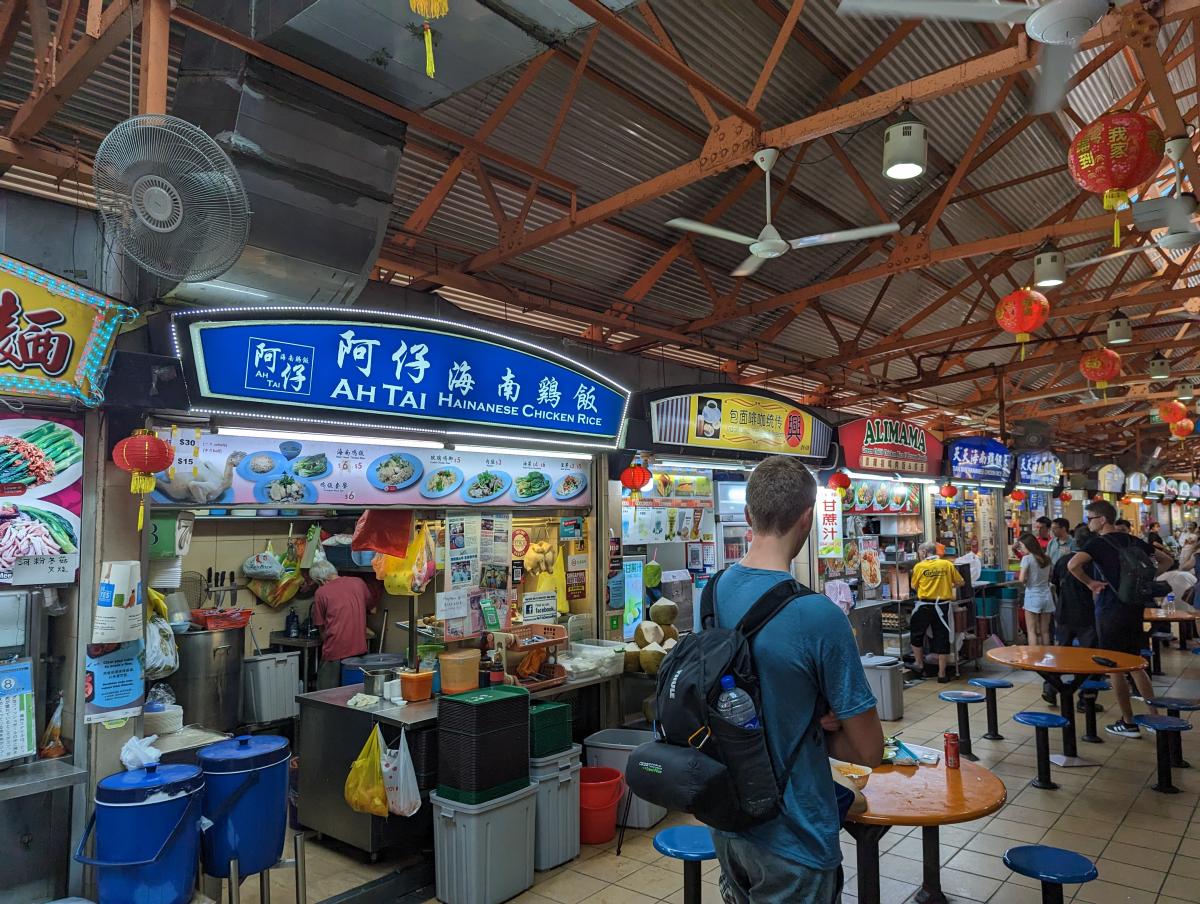Singlish, aka Singaporean English, is a commonly used dialect of English that has developed in Singapore over the generations. Nowadays, it’s commonly used by locals to talk to each other in every day life. Personally, Singlish sounds a bit funny to me but even I’ve cherry picked a few phrases that I enjoy using in my day to day life.

This post will explain just what Singlish is and some of the common phrases that are used throughout Singapore. Whether you’re an expat living in Singapore for work purposes, or a tourist visiting Singapore for a few days, learning Singlish will be a fun addition to your trip.
What is Singlish exactly?
Singlish, or Singapore English, is a unique dialect of English that has developed in Singapore. It emerged as a result of Singapore’s multilingual and multicultural history.
Singapore was founded as a British colony in the early 19th century and became an important trading port. As a result, people from many different countries and cultures came to Singapore, including Chinese, Malays, Indians, and Europeans. The different languages and cultures mixed and influenced each other, creating a unique Singaporean culture and language.

In the early years of Singapore’s independence in the 1960s and 1970s, there was a push to promote standard English and discourage the use of Singlish. This was seen as a way to help Singaporeans compete internationally and present a more professional image. However, Singlish remained popular among Singaporeans, especially among the working class and the younger generation.
Over time, Singlish evolved and developed its own unique vocabulary and grammar rules. It draws from various languages, including English, Malay, Chinese dialects, and Tamil. Singlish also incorporates a lot of slang and colloquialisms, making it more expressive and colorful than standard English.

Today, Singlish is a part of Singaporean identity and culture. It is widely spoken in everyday conversations, in the media, and in popular culture. While some Singaporeans may still feel that standard English is important for formal settings, Singlish continues to be a vibrant and important part of Singapore’s linguistic heritage.
Do you actually need to know Singlish to live in Singapore?
No, you absolutely do not need to learn Singlish to survive in Singapore. It’s not like learning German while living in Germany. Singlish is a completely made up language that just developed over the years through cultural interaction. You’ll never find Singlish as a recognized official language or on an app like Google Translate. Singlish is purely slang that the locals use to talk to each other.

As a foreigner, Singaporeans will not talk to you in Singlish unless you look like you’re local. Otherwise, they will automatically assume you don’t know Singlish and always speak in normal English. After all, there is a stigma with Singlish that it might sound “uneducated” when conversing with an English native speaker. Singapore does after all have one of the best education systems in the world and they are definitely not learning Singlish from a young age.
The exception to this rule is if you’re conversing with older Singaporeans who grew up in a different era before education standards were as high as they are.
Nevertheless, it is fun to learn a few phrases in Singlish just for the hell of it. I routinely use phrases like “can” or “cannot” as a single yes or no answer to questions. Every now and then, I throw in a “lah” just because.
“Do you want to have dinner tomorrow night?”
“Can”
“How about brunch on Saturday?”
“Cannot lah. I have other plans already”
Singlish is hard to understand
Personally, if someone speaks to me in full blown Singlish, I can barely understand it. I remember having a laksa in a hawker market in the Geylang area sitting next to an old Singaporean man. We started speaking in English having small talk. I really enjoyed talking to the guy until a few minutes into it, I realized I could only really understand about half of what he said.
We then switched to Mandarin Chinese which I am somewhat fluent in. He could also speak Chinese but with a heavier Hokkien accent. We started having good conversation in Chinese until a few minutes into it, I realized I could also just understand half of what he said. We switched back to English/Singlish and back to Chinese until the end where I realized I didn’t really understand anything he said. Funny enough, he understood everything that I was trying to say!
Singlish Dictionary: Commonly used words and phrases for Singapore
Aiyah
An exclamation of frustration, similar to “oh no”.
Alamak
An expression of surprise, similar to “oh my goodness” or “oh no”.
Ang Moh
Used to refer to a caucasian or white person.
Bojio
Used when someone didn’t invite you to an event or gathering, similar to “why didn’t you invite me?”.
Buay Tahan
Used to describe something that is unbearable or intolerable, similar to “cannot take it”.
Can or Not
Used to ask if something is possible or if someone is able to do something, similar to “is it possible?”.
Chope
To reserve or save a seat or table, often by placing an item on it.
Confirm Plus Chop
Used to emphasize that something is true or certain, similar to “definitely”.
Die Die Must Try
Used to describe something that is a must-try, similar to “you have to try it”.
Don’t play play
Used to warn someone not to mess around or take something lightly, similar to “don’t joke around”.
Eh
Used to get someone’s attention or to express surprise, similar to “hey”.
Gostan
To reverse or move backwards.
Hei
Used to call someone’s attention or to ask a question, similar to “hey”.
Jalan-jalan
To take a leisurely walk or stroll.
Jiak
To eat.
Jio
To invite someone to do something or go somewhere.
Kan Cheong
Used to describe someone who is anxious or nervous.
Kaypoh
Used to describe someone who is nosy or curious.
Kena
To be affected by something, often used to describe getting scolded or punished.
Kiasu
To be afraid of losing out or missing out on something.
Lai
To come, often used to invite someone to do something or go somewhere.
Lepak
To relax or hang out, similar to “chill out”.
Lor
Used to express a lack of choice, similar to “what to do”.
Machiam
Used to compare or emphasize something, similar to “just like”.
Mai Tu Liao
Used to urge someone to hurry up or stop procrastinating, similar to “don’t delay anymore”.
- On lah
Used to turn something on, similar to “turn it on”.
Orh
Used to acknowledge or agree with something, similar to “okay”.
Paiseh
To feel embarrassed or ashamed.
Pui Pui
An expression of disgust, similar to “yuck”.
Sabo
To sabotage or cause trouble for someone.
Shiok
Used to describe something that is extremely enjoyable or satisfying.
Siam
To avoid or stay away from something or someone.
Sian
Used to describe something that is boring or uninteresting.
Siao
Crazy or insane.
Simi
What, often used to ask “what did you say?”.
Steady
Used to describe something that is impressive or cool.
Swee
Good or awesome.
Tahan
To withstand or endure.
Tio Bo
Used to ask if someone understands something, similar to “do you get it?”.
Tok Kok
To talk nonsense or brag
Wah lau eh
An expression of surprise or frustration, similar to “oh my goodness”.
Walau
An exclamation of surprise, similar to “wow”.
Kayu
Used to describe someone who is clumsy or inept.








